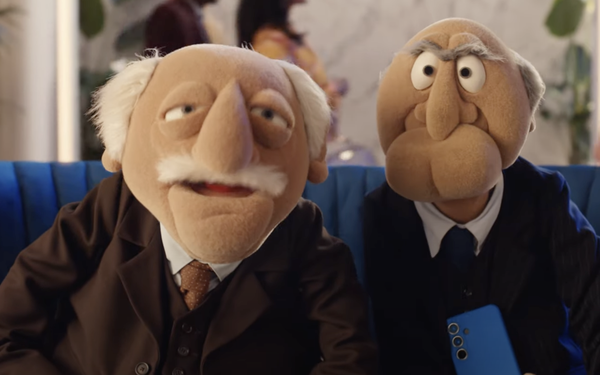
Booking.com was just
one Super Bowl advertiser that escaped to the 1980s.
Some of us ad fans have a hard time saying goodbye to Super Bowl week. But before turning the page -- as I’m sure the
losing Kansas City Chiefs would like to do -- it’s worth noticing what a difference eight years has made to marketing's conventional wisdom.
In 2017, just weeks after Donald
Trump’s first inauguration, many brands used the Super Bowl to loudly and proudly proclaim their purpose and their values, protesting the brewing storm of anti-immigrant, anti-LGBTQ, and racist
policies to come. And America loved it!
Anheuser-Busch ran “Born the Hard Way,” an ad telling the hard-knock immigrant story of Budweiser co-founder Adolphus Busch. Audi’s
“Daughter” made a heartfelt plea for gender equity. Both finished in the top five of that year’s USA Today’s Ad Meter.
advertisement
advertisement
And 84 Lumber’s powerful 90-second
ode to a Mexican mom and her daughter coming to America was such a forceful rebuke of Trump’s proposed border wall that Fox balked at airing the spot. Airbnb, too, used the Big Game as a way to
speak out against controversial travel bans.
Not this year, when ads went from “woke” to “What?” Many focused on sweet animals, funny aliens and adorable tiny
humans.
“Brands played it safe,” says Nicole Greene, vice president and analyst at Gartner. “It reflects our current cultural climate. Marketers focused on what we know to be
true about successful Super Bowl advertising, using nostalgia, humor, iconic music, and storytelling.”
There’s nothing wrong with that, of course. Given the tumult of recent months
-- fires, storms, politics -- “people just wanted some escape, and that’s what these big sports moments are all about.”
Who doesn’t love a good laugh? Or a baby horse?
The lack of political messaging may have pleased many if not most, consumers. Those on the conservative side of the spectrum have long wished ads would lay off the “woke” messaging, and
even people who once loved big-budget ad spots' liberal spin may welcome a little relief. If Hulu rebooted “Mr. Ed” right now, it would probably be a smash.
The ones who are lost
are marketers themselves. Since purpose-based branding took over the marketing universe around 2006, brands have spent tens of millions building “brands that stand for something.”
They’ve often linked that purpose to their beliefs about target consumer segments, noting that to grow, they needed to embrace the values of millennials and Gen Z: committed to the environment,
human rights, reproductive rights and LGBTQ issues. And if they are unwilling to make those connections any longer, either because of their fears of conservative backlash or the belief that purpose
just isn’t selling anymore, what comes next?
While the Super Bowl makes so much sense for smaller, younger brands looking for new audiences, legacy advertisers are milling around,
trying to figure out this new landscape, where purpose has morphed into cultural minefield.
“Some iconic brands are rethinking their strategies because they don't need
awareness,” Greene says. Done right, “those companies can still deliver a brand message in a largely celebratory environment.”
Done wrong or just done dull, though,
brands will struggle to justify an $8 million investment.
Nike’s “So Win” ad, with a message about the double standards women athletes face, and the NFL’s “Flag
50,” advocating for girl’s flag football teams in every state, struck Greene as soft. “There wasn’t a lot of complexity,” she tells Marketing Daily.
And at a moment when women’s sports are hot, and both Nike and the NFL are eager to expand female audiences, both smelled more like “we want your money” than “we’ve
got your back.”
This Super Bowl may have marked the funeral for purpose-driven advertising — or at least a moment of recalibration. Some marketers are ditching their values, but
many more are just recalculating risk. In a world where cultural landmines shift daily, many brands opt for the safest bet: humor, nostalgia, and uncontroversial entertainment. However, as younger
audiences continue to expect companies to reflect their values, the real test will be whether brands can find new, more authentic ways to stand for something—without standing in the line of
fire.